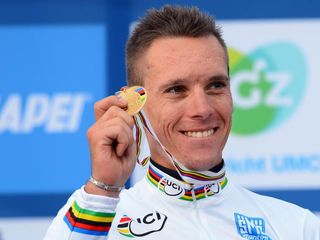Gilbert: In the Worlds, first place is all that counts
Belgian unhappy with collaboration in chase group

Never mind truth and reconciliation, the immediate aftermath of the World Championships road race is a theatre of truth and recrimination. For the winner, the podium, the rainbow jersey and the handshakes. For the vanquished, the mixed zone, the microphones and the instant post-mortems.
On Sunday afternoon in Ponferrada, they soft-pedalled past, faces muddied and haunted after almost seven hours in the rain. For some, the disappointment is such that they prefer to breeze straight through and compose their thoughts aboard the team bus before speaking to the press. Others are keen to state their case immediately.
Philippe Gilbert, certainly, was happy to get things off his chest when he was flagged down by a group of reporters. He had been the man powering the small chasing group on the final descent as they stalked lone escapee Michal Kwiatkowski (Poland) all the way to Ponferrada, but his appeals for help as the road flattened out fell on deaf ears.
Tony Gallopin (France) declined the invitation to come through, while Alejandro Valverde (Spain), Simon Gerrans (Australia) and Matti Breschel (Denmark) also demurred. With Gilbert’s teammate Greg Van Avermaet also in the break, they felt the onus was on the Belgians to make the running.
Kwiatkowski duly stayed clear to take the world title, while Gerrans and Valverde swept up the medals. Van Avermaet could only manage 5th, while a frustrated Gilbert rolled across the line in 7th place.
“I don’t understand the tactics of the riders who were with us, like Gallopin. Not just him, mind, although I don’t know who else was there too because it was all so fast,” Gilbert said.
“It’s different in a classic, where a podium can be a decent result or a top five place. In the Worlds, first place is all that counts. I don’t understand why people make calculations just to finish second or whatever. In the end, it’s just personal satisfaction if you finish in the top five, it doesn’t have a lot of value.”
Get The Leadout Newsletter
The latest race content, interviews, features, reviews and expert buying guides, direct to your inbox!
Gilbert had arrived in Ponferrada some way short of his best and he found himself in the unfamiliar position of riding in a supporting role for the Belgian squad, but when Joaquim Rodriguez (Spain) triggered the attacking on the final climb of Mirador, he was quick to respond.
“When I saw Rodriguez going, I didn’t panic. I waited five or six seconds and then I came over him. The last climb was good for me,” he said.
At that point, Gilbert perhaps harboured hopes of a second rainbow jersey, but once he realised that Van Avermaet was also part of the elite group, he quickly reverted to his designated role. Once fierce rivals during their days together at Lotto, the hatchet has apparently been buried since they linked up again at BMC. Certainly, there was no trace of discord here, as Gilbert was generous in his supporting efforts in the finale.
“When I saw Van Avermaet coming up and I quickly understood what I needed to do,” he said. “I was going to ride for him to bring him back for the sprint because on a finish like that he’s faster than me, I didn’t hesitate. We deserved at least a podium but I don’t have any regrets.
“As a team, our tactics was good. [Tom] Boonen was our number one sprinter if it was a big group, then Greg was number two in the event of a smaller group.”
Unable to come around Valverde, Van Avermaet ultimately fell short in the sprint, although Kwiatkowski’s smart attack meant that it was for the silver and bronze medals rather than for the grandest prize of all.
“It’s a pity Valverde closed the door on me, otherwise I would have been in the top three for sure,” Van Avermaet said. “Gilbert worked really well but there was not much to do. The others in the group wouldn’t work and I had to save myself for the sprint. It’s a pity, because I had good legs. I was on a good day.”
Nobody, though, was on good a day as Kwiatkowski, who ought to have alerted the world to his intentions when he set his Polish team to work for several laps midway through the race, an effort that pegged back much of the early break’s 15-minute advantage.
“At the start, we were all wondering why the Poles were riding because it was so early,” Gilbert said. “Of the nine Poles, four or five were from continental teams so we knew they weren’t going to keep it up for 250 kilometres.”
When Kwiatkowski careered away on the long descent of Confederacion on the final lap, Gilbert wondered if the Pole had played his hand too early, particularly with so many strong teams still so well represented in the main body of the peloton at that point.
“I saw Kwiatkowski going away on the descent and I didn’t really think he’d stay away, but he was clearly very strong,” Gilbert said, later musing: “The winner is always right.”
Amid the recrimination, there is always truth.

Barry Ryan was Head of Features at Cyclingnews. He has covered professional cycling since 2010, reporting from the Tour de France, Giro d’Italia and events from Argentina to Japan. His writing has appeared in The Independent, Procycling and Cycling Plus. He is the author of The Ascent: Sean Kelly, Stephen Roche and the Rise of Irish Cycling’s Golden Generation, published by Gill Books.
Most Popular

